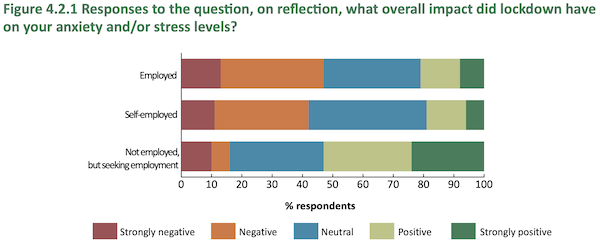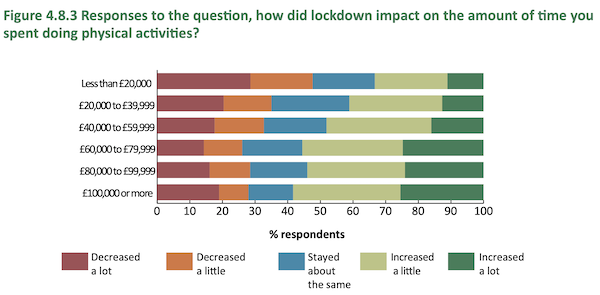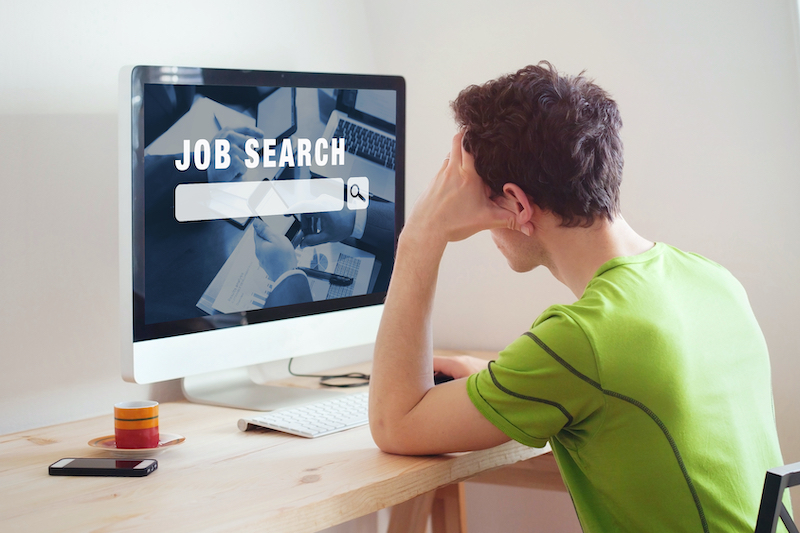

Lockdown had a 'negative' or 'strongly negative' impact on the mental health of over a third of the island's workforce, according to the States' community survey.
3,699 people completed the survey, which sought to find out how lockdown had affected island residents and therefore how it could be adapted if the Bailiwick ever had to impose similar restrictions again.
39% of employed people said lockdown had negatively impacted their mental wellbeing, and 35% of self-employed people agreed.
According to the survey, those working in the Information & Communication sector were the worst affected, with more than half reporting a negative impact on their mental health. The results show a corresponding increase in workload or hours and a negative impact on work-life balance for those working in the sector.
However, 24% of employed respondents and 19% of self-employed respondents said the restrictions had positively impacted their mental health.

Pictured: Many respondents said lockdown had a negative impact on their anxiety and stress levels.
Critical workers were more likely to report a positive impact compared to non-critical workers.
The majority of people who were seeking work at the time said lockdown had a neutral impact on their mental wellbeing.
But when it comes to physical health, the impact of lockdown swayed towards the positive side, with 38% of employed respondents and 34% of self-employed respondents saying the restrictions positively affected their physical wellbeing.
The respondents were asked for their thoughts on the lockdown restrictions, which were most disputed by the self-employed respondents.
21% of the self-employed people who completed the survey thought some of the aspects of lockdown were unfair or unjustified, compared to 13% of employed people and 4% of those seeking employment.

Pictured: For some respondents, lockdown has a positive impact on their physical health.
Some said the rules should have been relaxed at an earlier stage to allow sole traders or gardeners to operate, while others said it was unfair that essential workers were seeing new people every day but weren't allowed to see their own families.
Some respondents took the view that it was unfair to let some retail businesses open when others couldn't, and the travel restrictions were said to be too strict to maintain the economy.
The States have published the Community Survey Report alongside the Population, Employment & Earnings Bulletin, which offers extra information on how lockdown affected the workforce.
It shows that, in June this year, there was an annual decrease of 4.9% in the number of employed people and 0.1% in the number of self-employed people compared to 2019.
The median earnings of employees was 2.5% higher in nominal terms and 0.7% in real terms than a year earlier, but it's thought this will have been caused by the larger decrease in the number of employees in the lower earning brackets than in the upper earning brackets.

Pictured: The number of wholly unemployed people rose significantly during lockdown.
By 3 October, the number of wholly unemployed people in Guernsey had fallen to 1.8%, from a peak of 5.2% in late May.
"We've published these two reports alongside each other to try and give as full a picture of the economically active population as we can," said Head of Data & Analysis for the States, Helen Walton. "We’ve been able to use the electronic census to provide some extra details to supplement what we routinely publish and help understand the statistics that are emerging.
"The survey results add an extra dimension, by showing the personal impacts of lockdown on employees and self-employees by sector, plus the experiences of those that were job-seekers or students during lockdown.
“We will continue to analyse the data in more detail and we are planning to issue further detailed reports with more findings from the survey later in the year.”
The Community Survey Report is available to read HERE, and the Population, Employment & Earnings Bulletin can be read in full HERE.
Comments
Comments on this story express the views of the commentator only, not Bailiwick Publishing. We are unable to guarantee the accuracy of any of those comments.